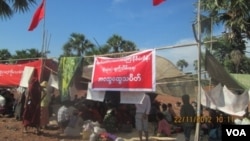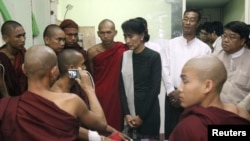BANGKOK —
Burma is overdue to release a report on a controversial copper mine backed by the military and China but facing strong opposition. Rights activists say the investigation into the mine is a test of the new government and of democracy leader Aung San Suu Kyi, who was appointed head of the commission looking into the copper deal.
The commission appointed by Burma's president to examine the Letpadaung copper mine was due to release its findings by January 31.
But the date came and went without a report or immediate explanation on how the investigation into the central Burma project was proceeding.
Burma’s largest copper mine is run by a Chinese company in cooperation with the Burmese military-owned Union of Myanmar Economic Holdings Company Limited (UMEHL).
Their plan for a $1 billion expansion came up against protests from local villagers who say they were unfairly compensated and are worried about the environmental impact.
Late last year, a months-long demonstration was violently dispersed by police.
Thein Than Oo, head of the Legal Committee at the Burma Lawyer's Network, says they uncovered evidence the police fired canisters of white phosphorus, a powerful incendiary, to break up the protest.
"They want to warn the whole entire people that don't touch…M-E-H-L. This is a matter of business. It is untouchable. And, second, is to intimidate people," he said.
Thein Than Oo says they want to know who ordered the police action, as some suspect members of the military may be involved.
Despite the controversy over the crackdown, it is unclear if Aung San Suu Kyi’s commission even has a mandate to investigate it.
David Mathieson, an Asia researcher with Human Rights Watch, says this investigation is new territory for Burma's civilian-led government.
"The protest and the crackdown on the protest, and all the other issues around Letpadaung and the copper mine, they're serious enough as it is. But, this is also a very important test case in how the authorities handle peaceful protests and land rights issues and how the authorities deal with it. So, I think it has great symbolic importance," he said.
The copper mine deal between the Chinese company and Burma's military was struck during military rule and is criticized for a lack of transparency.
Aung San Suu Kyi has already weighed in on the dispute, saying that although the rights of villagers need to be protected, Burma also needs to honor its agreements with foreign companies.
Mathieson says the commission's report is also a test case of Aung San Suu Kyi as a politician.
"As someone not just has to be involved in investigating a very serious incident but in actually bringing along different members of the political kaleidoscope with her. So, I think we're really going to see how effective she is as a political leader through this exercise," he said.
NLD spokesman Nyan Win says when the report is finally released it should indicate how Aung San Suu Kyi handles the competing pressures.
"We should wait and see [the] final report, what pressure, and what she can do for the benefit of the Letpadaung area people," said Nyan Win.
Meanwhile, Burmese media reports this week indicate protests have continued near the mine. China’s ambassador to Burma also weighed in on the issue this week in meetings with the minister of mines.
A statement by China's Embassy says the ambassador expressed hope that Burma would earnestly protect China's business interests and help resolve any outstanding problems.
The commission appointed by Burma's president to examine the Letpadaung copper mine was due to release its findings by January 31.
But the date came and went without a report or immediate explanation on how the investigation into the central Burma project was proceeding.
Burma’s largest copper mine is run by a Chinese company in cooperation with the Burmese military-owned Union of Myanmar Economic Holdings Company Limited (UMEHL).
Their plan for a $1 billion expansion came up against protests from local villagers who say they were unfairly compensated and are worried about the environmental impact.
Late last year, a months-long demonstration was violently dispersed by police.
Thein Than Oo, head of the Legal Committee at the Burma Lawyer's Network, says they uncovered evidence the police fired canisters of white phosphorus, a powerful incendiary, to break up the protest.
"They want to warn the whole entire people that don't touch…M-E-H-L. This is a matter of business. It is untouchable. And, second, is to intimidate people," he said.
Thein Than Oo says they want to know who ordered the police action, as some suspect members of the military may be involved.
Despite the controversy over the crackdown, it is unclear if Aung San Suu Kyi’s commission even has a mandate to investigate it.
David Mathieson, an Asia researcher with Human Rights Watch, says this investigation is new territory for Burma's civilian-led government.
"The protest and the crackdown on the protest, and all the other issues around Letpadaung and the copper mine, they're serious enough as it is. But, this is also a very important test case in how the authorities handle peaceful protests and land rights issues and how the authorities deal with it. So, I think it has great symbolic importance," he said.
The copper mine deal between the Chinese company and Burma's military was struck during military rule and is criticized for a lack of transparency.
Aung San Suu Kyi has already weighed in on the dispute, saying that although the rights of villagers need to be protected, Burma also needs to honor its agreements with foreign companies.
Mathieson says the commission's report is also a test case of Aung San Suu Kyi as a politician.
"As someone not just has to be involved in investigating a very serious incident but in actually bringing along different members of the political kaleidoscope with her. So, I think we're really going to see how effective she is as a political leader through this exercise," he said.
NLD spokesman Nyan Win says when the report is finally released it should indicate how Aung San Suu Kyi handles the competing pressures.
"We should wait and see [the] final report, what pressure, and what she can do for the benefit of the Letpadaung area people," said Nyan Win.
Meanwhile, Burmese media reports this week indicate protests have continued near the mine. China’s ambassador to Burma also weighed in on the issue this week in meetings with the minister of mines.
A statement by China's Embassy says the ambassador expressed hope that Burma would earnestly protect China's business interests and help resolve any outstanding problems.












